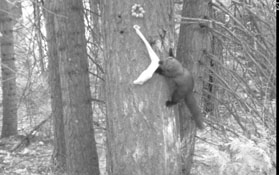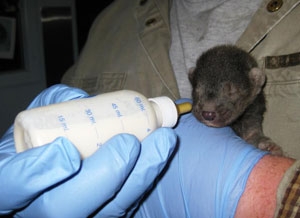Posts Tagged: Rick Sweitzer
UC wildlife research team seeks single socks
The team is part of the Sierra Nevada Adaptive Management Project (SNAMP), which is examining the effects of forest thinning, as currently done by the U.S. Forest Service, on the health of local wildlife, the forest and water resources. The U.S. Forest Service implements these thinning treatments out of concern for excessive fire risk.
But what kind of research could go through hundreds of socks a month? After years of experimentation, the research team has determined that socks are the ideal receptacle for hanging fisher bait in trees. The baited socks are hung in trees in view of motion-activated cameras. As the animal moves, climbing the tree and chewing on the sock, the camera takes photos that allow the scientists to identify the species.
The researchers are going through 250 pairs a month, at a considerable cost, to create the “chicken in a sock” bait stations to survey the distribution of Pacific fishers in a 500-square-mile area of forest near Bass Lake.
Besides the cost, Rick Sweitzer, UC Berkeley wildlife biologist and project leader. is spending time in the Wal-Mart checkout line with a cart full of socks when he could be doing research. The scientists don’t need new socks; they would prefer old, unmatched, non-holey ones,something everyone has cluttering up their sock drawers.
In an effort to reduce, reuse and recycle, the SNAMP wildlife research team is
putting out a call for lost and lonely socks. Socks may be delivered or mailed
to 40799 Elliott Dr., Oakhurst CA 93644.
The Pacific fisher is a small, nocturnal carnivore that perches and dens in large,
old-growth pine and oak trees. Once widespread across the high elevation
forests of the Sierra Nevada and in the coastal mountains of northwestern
California, fishers are now only found in two small isolated populations. One
group lives near the California-Oregon border. The others are in the southern
Sierra Nevada.
Data being collected by UC scientists about the movements, habitat preferences and
survival of fishers in the southern Sierra Nevada will be used to aid the
multiple agencies, academic institutions, environmental groups, and mountain
residents who are working together to ensure that long-term wildland management
promotes forest health, wildfire control and wildlife conservation.
For more information, contact Anne Lombardo at amlombardo@ucdavis.edu.
To read more about the research project visit the SNAMP website at http://snamp.cnr.berkeley.edu.
###
EDITORS: A photo of a Pacific fisher grabbing a bait-filled
sock can be downloaded from http://ucanr.org/blogs/Green.
Four baby fishers to be closely monitored by scientists
Four Pacific fisher kits who were returned to the wild last week will be closely monitored by UC Berkeley wildlife biologists who are interested in knowing how the animals assimilate to the forest after being reared in captivity, according to the Fresno Bee.
The kits were rescued last May, when their mothers - part of a multi-year Pacific fisher study - were killed, one by a bobcat, the other by a car. UC Berkeley wildlife biologist Rick Sweitzer delivered the animals to the Fresno Chaffee Zoo, where they were nursed to health.
Zoo veterinarian Lewis Wright told Bee reporter Marc Benjamin that zoos are preferable to ordinary veterinary hospitals for weasel-like fishers because the wild animals are susceptible to dog and cat illnesses. The juvenile fishers were later pen reared near Bass Lake.
The fisher rescue and release became part of the seven-year Sierra Nevada Adaptive Management Project, in which fishers are fitted with radio transmitter collars and monitored to study their fate in a forest ecosystem subject to timber harvest and development.
Currently 23 fishers are monitored daily. Scientists surgically implanted transmitters in the four fishers released last week to eliminate the risk of losing their collars.

A fisher peeks out of a temporary enclosure during release.
Pacific fisher kits returned to the wild
Four baby Pacific fishers were released in the forest this week, with the aid of UC Berkeley scientists who are studying the Sierra Nevada population of the rare weasel-like carnivore.
Pacific fishers were once an abundant species, but the population has been in decline for more than 20 years. As part of the Sierra Nevada Adaptive Management Project (SNAMP), an ongoing study aims to determine what factors are influencing the fishers' fate, such as habitat loss, timber harvest, disease, development and climate change.
"We are extremely excited that the four fisher kits have been repatriated back out in the forest, where we hope they will survive and become part of the fisher population in this area," said Rick Sweitzer, UC Berkeley Research Wildlife Biologist and Adjunct Associate Professor.
Last May, two fishers being monitored as part of the SNAMP study were killed – one by a bobcat, the other hit by a car on Highway 41. It just so happened they were both nursing mothers.
“We knew that the female fishers had kits, and that these animals are rare in California,” Sweitzer said. “We couldn’t in good conscience let the baby animals perish in their den cavities knowing we might be able to intervene.”
The scientists staged two daring rescues and spirited the babies to the Fresno Chaffee Zoo for care. In time, the young animals were moved to a large pen and taught to hunt live prey by a regional wildlife rehabilitation organization. The young fisher kits have been under the care of the Fresno Chaffee Zoo, by agreement with the California Department of Fish and Game. Last week, the Department of Fish and Game gave approval for the "juvenile" fishers to be released back out into the forest.
"We aided this process by finding the most appropriate release areas where the animals will be most likely to find food in good quality fisher habitat," said Sweitzer.
Two of the fisher kits were released in the west Kaiser area. Two others were returned to the Beasore Road/Chilkoot Lake area of the Sierra National Forest, close to where their mother was killed in the SNAMP study area.
Unusual circumstances precipitated the two fishers' release into an area where their population is being researched. Late last year, two fishers died during captures when they were given anesthetic agents from a particular production lot that, unbeknownst to the scientists, had been causing serious problems with domestic pets and other animals and were subsequently recalled, but not until after both fisher deaths had occurred. With permission from the California Department of Fish and Game, two of the fisher kits replaced the two that died because of the research project.
Read more about the UC Pacific fisher study.

A young Pacific fisher steps out into wildnerness.
Pacific fisher orphans on Fresno TV
Five Pacific fisher orphans were featured on Fresno's KSEE Channel 24 news last Friday. The story includes great video of the five tiny, weasel-like animals now being cared for at the Fresno Chaffee Zoo.
The orphaned fishers were rescued by an Oakhurst-based UC Berkeley team that is studying the Pacific fisher population in the southern Sierra Nevada. The animals are the offspring of two fisher females that were part of the study. One was killed by a bobcat, the other hit by a car. Get all the rescue details in this UC news release.
Unfortunately, the Channel 24 story omitted the fact that researchers are looking for support from the community to care for the fishers so they can be returned to the wild. To make a contribution for milk replacement formula and supplies to build a temporary habitat, contact Anne Lombardo of UC Cooperative Extension at amlombardo@ucdavis.edu, (559) 676-0576.
The Pacific fisher story also appeared in the Sierra Sun Times and Yubanet.com.

UC research crew member uses tree climbing equipment to reach orphan fishers in an unstable snag.


